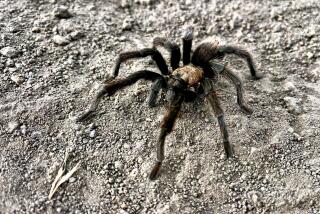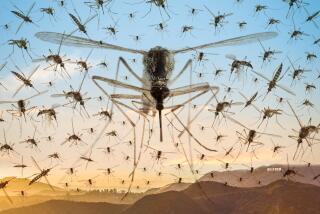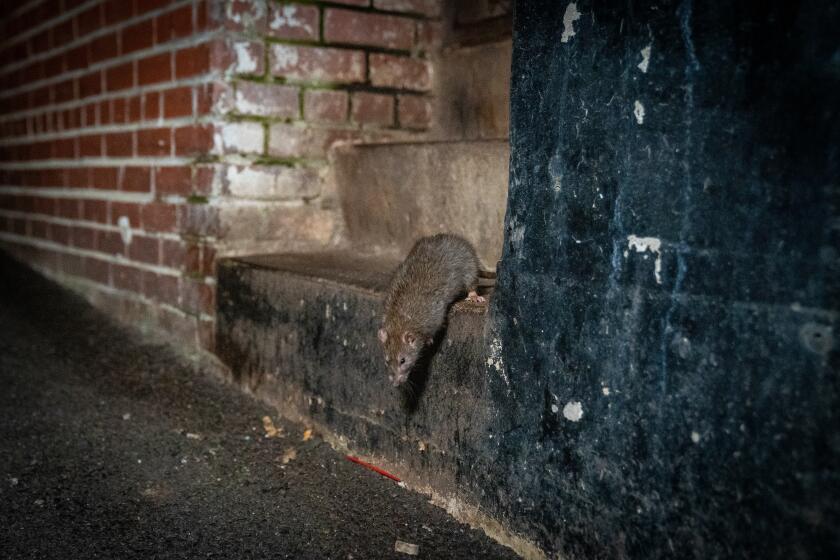Noisy Little Buggers About to Hit the East
- Share via
WASHINGTON — As warmer weather arrives along the East Coast, the cicadas of Brood X are rousing from 17 years underground.
When the ground reaches 64 degrees, as early as this week, inch-long nymphs will emerge, shed their skins and molt into adults with black bodies, red eyes and transparent, orange-veined wings.
Then they’ll start singing. Each male emits a droning mating call about as loud as a car engine. And they should create quite a chorus. In places that haven’t been paved over, from 100,000 to 1 million Brood Xers are expected to surface per acre -- an area slightly smaller than a football field.
Appearing in parts of 15 states and the District of Columbia -- from southern New York to northern Georgia and west into Illinois -- Brood X has the longest hibernation and one of the largest populations of the 13 broods of cicadas, experts say. The area around the nation’s capital is expected to be the epicenter of the outbreak.
Over the six weeks after they emerge, the cicadas will sing, mate, lay eggs in tree branches and die. Tiny nymphs will fall from the eggs and burrow into the earth, where they will suck on sap from tree roots until 2021.
This entomological event has a lot of people excited -- and a little apprehensive.
“Anybody’s gut reaction to billions of bugs coating their yard is to unashamedly freak out,” said Dan Greene of Rockville, Md., who, at 17, is just slightly older than the emerging cicadas. In fact, the sloughed-off skins will litter suburban yards, crunching under every step.
Many people think that cicadas and locusts are the same, since both arrive in swarms after lengthy hibernation periods, but they are different species; locusts are more closely related to grasshoppers, while cicadas are more similar to aphids. And unlike locusts, which can severely damage plants, cicadas are basically harmless -- unless you consider noise a problem.
Each male uses an organ on its abdomen, called a tymbal, to produce a mating call that registers between 80 and 100 decibels, or about as loud as a “noisy gasoline engine,” University of Maryland entomologist Michael Raupp said.
The size of the population magnifies the noise pollution, drowning out conversations and driving people indoors.
“I’m really not looking forward to the noise, especially with prom, graduation and summer party season fast approaching,” Greene said.
In anticipation of this septendecimal event, Broodwear.com is selling cicada T-shirts, and the University of Michigan’s Zoology Museum is creating an ode to the six-legged creatures. Websites like cicadamania.com offer insect trivia, even guides for planning outdoor events around the party crashers, with a cartoon of a gown-wearing insect captioned “Your Big Fat Cicada Wedding.”
Washington’s Ritz-Carlton hotel is placing cicada-shaped chocolates on guests’ pillows and offering a citrus-based Cicada Cocktail. And intrepid cooks are fine-tuning recipes for Shanghai cicadas, “El Chirper” tacos and cicada rhubarb pie.
It’s not just humans who may chowdown on the bugs. Dogs and cats are attracted to them, drawn by their noise and their tendency to fly close to the ground, which make cicadas easy pickings for pets. An upset stomach is the likely result of eating too many, said John Hadidian, urban wildlife director at the Washington-based Humane Society of the United States.
Though female cicadas don’t contribute to the noise, they affect the environment in other ways. Laying their eggs in tree limbs can damage fruit and small trees.
Sherri Hutchison, a West Virginia Department of Agriculture forest entomologist, suggested covering susceptible plants with cheesecloth. Larger trees will incur “nasty-looking scars,” but their loss of twigs is equivalent to a good pruning, she said.
Suburban development in recent years has caused a decline in the cicada population.
“In 1970, the cicadas’ arrival had a locust-type effect, like the plague,” said Robert Pitt of Allen’s Tree Service in Washington. “But in 1987, it was not nearly as bad.”
Though there may not be as many of the insects as 17 years ago, there will be plenty -- so contingency plans are required.
Goucher College in Baltimore issued a statement last week noting its plans to relocate its outdoor graduation ceremony May 21 to the Sports and Recreation Center “in the event of rain or cicadas.”
And Washington wedding planner Meg McDonald has warned brides of the potential for cicadas to put a damper on their events.
So far, she said, no brides have changed plans. While the bugs are “an annoyance,” she said, “it’s only once every 17 years.”
More to Read
Sign up for Essential California
The most important California stories and recommendations in your inbox every morning.
You may occasionally receive promotional content from the Los Angeles Times.










